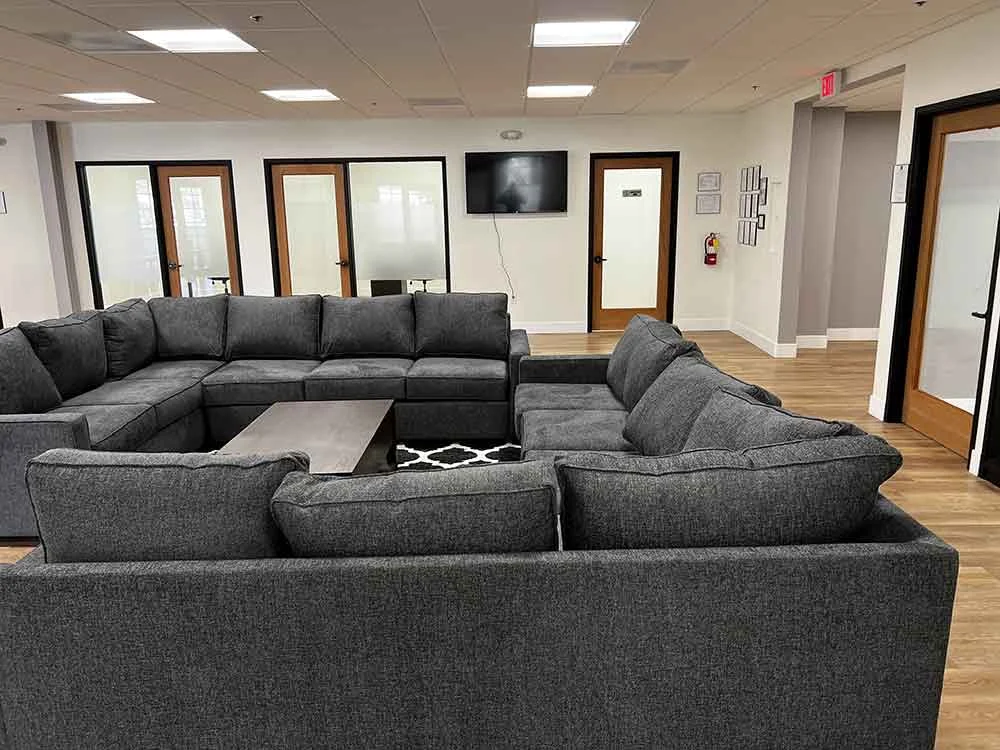The emergence of mental illness, especially among individuals diagnosed with schizophrenia, is a highly distressing period for both the affected individuals and those in their immediate surroundings. A lack of proper education or exposure to information regarding this condition often drives many individuals toward substance abuse as a coping mechanism. This, in turn, exacerbates the situation, leading to a premature onset of psychotic symptoms, induced psychotic relapses, or a heightened severity in symptoms.
Individuals grappling with both schizophrenia and addiction encounter amplified cognitive impairment, severe psychosis, and an elevated likelihood of requiring emergency services. Additionally, they are more prone to facing legal issues and incarceration.
Continue reading to delve into the relationship between schizophrenia and substance abuse, and the addiction and mental health treatment options available at Santa Barbara Recovery in Southern California.

What is Schizophrenia?
Schizophrenia is a serious mental illness (neurological disorder) that impacts an individual’s thoughts, emotions, and actions. Those affected by schizophrenia often struggle to differentiate between their thoughts and reality, leading to symptoms such as hallucinations, delusions, disorganized thinking and speech, abnormal movements, and diminished emotions and motivation.
Psychotic disorders, including schizophrenia, typically emerge during late adolescence or early adulthood and necessitate ongoing treatment. It impacts approximately 1% of the United States population, affecting an estimated 1.5 million adults. Worldwide, Schizophrenia affects approximately 24 million people or 1 in 300 people (0.32%). This rate is 1 in 222 people (0.45%) among adults.
Individuals with schizophrenia often struggle to differentiate between what is real and what is imaginary. Additionally, they may find it challenging to respond appropriately to various social situations, leading to difficulties in maintaining healthy interpersonal relationships in areas such as work or school.
It is important to note that schizophrenia is distinct from multiple personality disorder, as most individuals with schizophrenia do not exhibit multiple personalities and are not inherently violent. Unfortunately, many individuals with schizophrenia may turn to substance abuse as a means of coping with their symptoms, which typically exacerbates their condition.
While the exact causes of schizophrenia remain unknown, mental health professionals can diagnose the condition based on a person’s symptoms, medical history, and psychological assessment. Treatment approaches vary depending on the individual, to reduce symptom severity and frequency, as well as enhance the individual’s overall quality of life. Seeking treatment at a rehab center specializing in treating schizophrenia and addiction is often the most effective way to manage and alleviate symptoms.
According to the National Alliance on Mental Illness (NAMI), 20 million people live with schizophrenia but less than a third are treated. At Santa Barbara Recovery in Southern California, we strive to change that daily.
Types of Schizophrenia
Previously, various types of schizophrenia were utilized for diagnostic purposes, but they have since been invalidated by the current diagnostic manual (DSM-5). Nevertheless, a small number of mental health professionals still find them beneficial in terms of identifying the symptoms and treatment of schizophrenia. The following were the primary types of schizophrenia that were formerly recognized:
- Paranoid Schizophrenia: This particular type is characterized by delusions and hallucinations that often revolve around persecution, conspiracy, or grandiosity.
- Disorganized Schizophrenia: This type of schizophrenia is marked by disorganized thinking, speech, and behavior, this type makes it challenging for individuals to function normally in their daily lives.
- Catatonic Schizophrenia: This type involves abnormal movements and postures, ranging from excessive activity to complete immobility. It may also include signs of echolalia (repeating what others say) or echopraxia (mimicking what others do).
- Residual Schizophrenia: Refers to a phase of schizophrenia where a person has previously experienced a psychotic episode but currently exhibits only mild or no symptoms.
- Undifferentiated Schizophrenia: This encompasses individuals who display schizophrenic symptoms that do not fit into any of the other types. They may exhibit a combination of positive, negative, and disorganized symptoms that vary in severity and frequency.
Signs and Symptoms of Schizophrenia
Schizophrenia has a profound impact on an individual’s personality and cognitive faculties. A key characteristic of this disorder is the presence of psychosis, where one’s actions deviate significantly from reality as perceived by others. Interestingly, schizophrenia is more prevalent among males than females, and its symptoms tend to emerge during pivotal life transitions.
These transitions could include the loss of a loved one, the breakdown of a family unit, or the start of a new school or job. Individuals who previously appeared content and mentally stable may gradually exhibit eccentric behavior, engaging in obscure actions and communicating in peculiar ways. Schizophrenia is characterized by several distinct indicators and manifestations that can be categorized into three groups: positive, negative, and cognitive.
1. Positive symptoms: These alter one’s perception of reality, leading to distortions.
2. Negative symptoms: Negative symptoms reduce or hinder one’s ability to function normally.
3. Cognitive symptoms impact an individual’s thoughts, memory, and attention span. Difficulty comprehending or using unclear language, challenges in learning, disorganized thinking, and holding false beliefs about accomplishments or persecution.
Some of the most common signs and symptoms of schizophrenia are:
- Hallucinations: Hallucinations occur when individuals see, smell, hear, or feel things that do not exist. Those with schizophrenia may engage in activities that are not real. Hearing voices is the most common hallucination experienced by individuals with schizophrenia.
- Paranoia: Characterized by delusional beliefs of being threatened, controlled, or persecuted. Individuals may obsess over conspiracy theories, fear being followed, or hear voices commanding them to harm themselves or others. They isolate themselves and may exhibit irritability, hostility, or the constant fear of others.
- Delusions: Having beliefs that are not grounded in reality. These misconceptions can pertain to various subjects and are typically based on disordered sensory experiences. Paranoia, feeling controlled, or delusions of grandeur are very common for people with this mental disorder.
- Disorganized speech: Facing difficulties with clear or logical communication, or using words that do not make sense. This arises from disorganized thinking, causing individuals with schizophrenia to struggle with organizing and maintaining their thoughts. This can result in incoherent speech patterns.
- Disorganized behavior: Acting inappropriately, bizarrely, or unpredictably, or inability to complete tasks.
- Lack of emotion: Absence of emotional expression, unsettling emotional responses, lack of empathy, flat facial expressions, and unpredictable mood swings.
- Lack of motivation: Having no interest or eagerness for daily activities, or being unable to start or finish them without help.
- Lack of social interaction: Withdrawing into a shell, or having severe struggles with forming or maintaining relationships.
- Difficulty concentrating: Withdrawing into a shell, or having severe struggles with forming or maintaining relationships.
- Difficulty remembering: Withdrawing into a shell, or having severe struggles with forming or maintaining relationships.
- Difficulty planning: Having trouble defining goals, making decisions, or solving problems.
What Are The Causes/Risk Factors for Schizophrenia?
Schizophrenia is a complex mental disorder with no definitive cause. However, certain factors may increase the risk of developing schizophrenia, such as:
- Genetic factors: Certain genetic variations may increase the susceptibility to both schizophrenia and addiction or heighten the sensitivity to the effects of substances. Additionally, having a family history of mental illness, particularly schizophrenia, elevates the risk of developing these conditions.
- Environmental factors: The experience of distressing or traumatic events, such as abuse, violence, or natural disasters, can exacerbate the symptoms of schizophrenia and drive individuals to seek solace in substance experimentation as a coping mechanism.
- Brain and body imbalances: Imbalances in brain chemistry, specifically dopamine, serotonin, or glutamate, may play a significant role in the development of schizophrenia and addiction.
- Self-medication: Individuals with schizophrenia may resort to substance use as a misguided attempt to alleviate or escape from their distressing symptoms, such as hallucinations, delusions, or negative emotions. Unfortunately, this approach often backfires, as substances can worsen psychotic symptoms or interfere with the effectiveness of prescribed medication.
- Recreational use: Some individuals with schizophrenia may engage in substance use for recreational purposes, out of curiosity, or due to social pressure. However, this behavior renders them more susceptible to developing addictions and experiencing the complications associated with co-occurring disorders.
- Aftercare Support: Recovery from PTSD is an ongoing process, and aftercare support is essential. Research whether the treatment center provides comprehensive aftercare services to ensure continued success.

The Relationship Between Schizophrenia and Addiction
Addiction and schizophrenia often occur together. It is estimated that 50% of individuals with schizophrenia also experience substance abuse. Those with schizophrenia often turn to drugs or alcohol as a way to self-medicate or alleviate their feelings of depression and anxiety. While substance abuse does not cause schizophrenia, it can act as an environmental trigger. Individuals with pre-existing genetic risk factors for schizophrenia may develop an active case of the disorder due to prolonged substance abuse.
Additionally, abusing drugs such as cocaine, amphetamines, and marijuana can worsen schizophrenia symptoms and make them more severe. Schizophrenia is often mistaken for substance abuse because both disorders share similar symptoms. This can make it challenging to accurately diagnose schizophrenia and co-occurring disorders. However, researchers study both conditions simultaneously to improve the accuracy of dual diagnosis.
Both schizophrenia and addiction are serious conditions that can impact your physical and mental health, as well as your social relationships and performance at work or school. When schizophrenia and addiction co-occur, it becomes even more crucial and challenging to provide appropriate treatment. A dual diagnosis is necessary to determine the most effective approach for addressing each condition.
- Schizophrenia and Alcoholism: Schizophrenia and alcoholism often coexist, with alcohol use disorder (AUD) being a prevalent dual diagnosis among about 25% of adults with schizophrenia. The consumption of alcohol can have detrimental impacts on the symptoms of schizophrenia. It is crucial to recognize the potential negative consequences of alcoholism in individuals with schizophrenia and address it as part of their comprehensive treatment plan.
- Schizophrenia and Marijuana: Marijuana has an impact on the brain and has the potential to induce psychotic symptoms, including hallucinations and delusions. These symptoms can potentially initiate the onset of schizophrenia in individuals with pre-existing conditions and may also exacerbate existing symptoms.
- Schizophrenia and Opioids: Opioids are substances that interact with the opioid receptors in the brain, resulting in pain relief, feelings of euphoria, and sedation. Additionally, opioid abuse may potentially elevate the likelihood of developing schizophrenia.
- Schizophrenia and Cocaine: Cocaine, a potent and highly addictive stimulant, can have a range of impacts on the brain and mental well-being. Misuse of cocaine may heighten the likelihood of developing schizophrenia or intensify symptoms of existing mental disorders. Amplifying the positive symptoms of schizophrenia, like delusions, hallucinations, and disorganized thinking, through its influence on dopamine and glutamate levels, two neurotransmitters linked to schizophrenia.
- Schizophrenia and Meth: Methamphetamine, also known as meth, is an extremely addictive stimulant with the potential to impact both the physical and mental well-being of an individual. Its impact on schizophrenia closely mirrors that of cocaine.
- Schizophrenia and Heroin: Heroin is a potent opioid with a high potential for addiction, exacerbating psychotic symptoms in individuals with a genetic susceptibility to schizophrenia. The impact of heroin on schizophrenia mirrors that of methamphetamine and cocaine, underscoring the challenge of managing both conditions when illicit substances are involved, and the increased likelihood of hospitalization or fatality.
Schizophrenia and Addiction Treatment
Schizophrenia and addiction are both serious conditions on their own, but when they occur together, treatment becomes even more complex and challenging. Fortunately, there are effective treatments for both disorders that typically involve a combination of the following strategies:
- Medications: Antipsychotic drugs can help alleviate symptoms of schizophrenia such as hallucinations, delusions, and disorganized thinking. Medications are also used to manage withdrawal symptoms and cravings associated with substance use disorder (SUD), as well as to prevent or reverse the effects of an overdose. Examples of medications used for addiction treatment include methadone, buprenorphine, naltrexone, and naloxone.
- Addiction Therapy Services: Types of psychotherapy, such as cognitive-behavioral therapy (CBT), motivational interviewing (MI), and family therapy, can help individuals with schizophrenia and addiction better understand their conditions, manage their emotions, and develop healthier coping mechanisms.
- Recovery Education: Programs that provide education on schizophrenia, addiction, the effects of substances on the brain and body, and the benefits of recovery can be beneficial. Examples of such programs include psychoeducation, relapse prevention, and dual recovery anonymous.
- Self-Help Groups: Peer support, mutual aid, and social interaction are offered by self-help groups for individuals with schizophrenia and addiction. These groups allow individuals to share their experiences, challenges, and successes with others who are facing similar struggles. Examples of self-help groups include Alcoholics Anonymous (AA), Narcotics Anonymous (NA), and Schizophrenics Anonymous (SA). By combining these treatment methods, individuals with schizophrenia and addiction can equip themselves with the necessary tools to effectively manage their conditions and regain control over their lives.

Santa Barbara Recovery Can Help You Get Your Life Back on Track
Schizophrenia and addiction can affect anyone it chooses, and if you or someone you are acquainted with is struggling with these challenges, there is no reason to feel ashamed. Assistance is readily available for both you and your loved ones.
Timely identification of schizophrenia as well as other mental health conditions or addictions, can significantly contribute to your recovery and ability to cope. Our admissions team is ready to assist you in enrolling in one of our treatment programs or addressing any concerns you may have. We are here to provide the help you need.
Reach out to us today to learn more about how we can support you.













